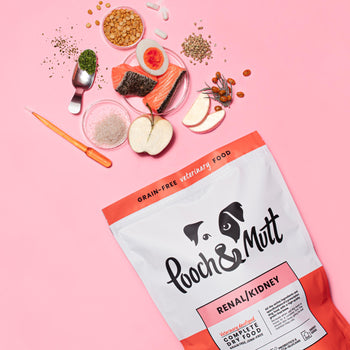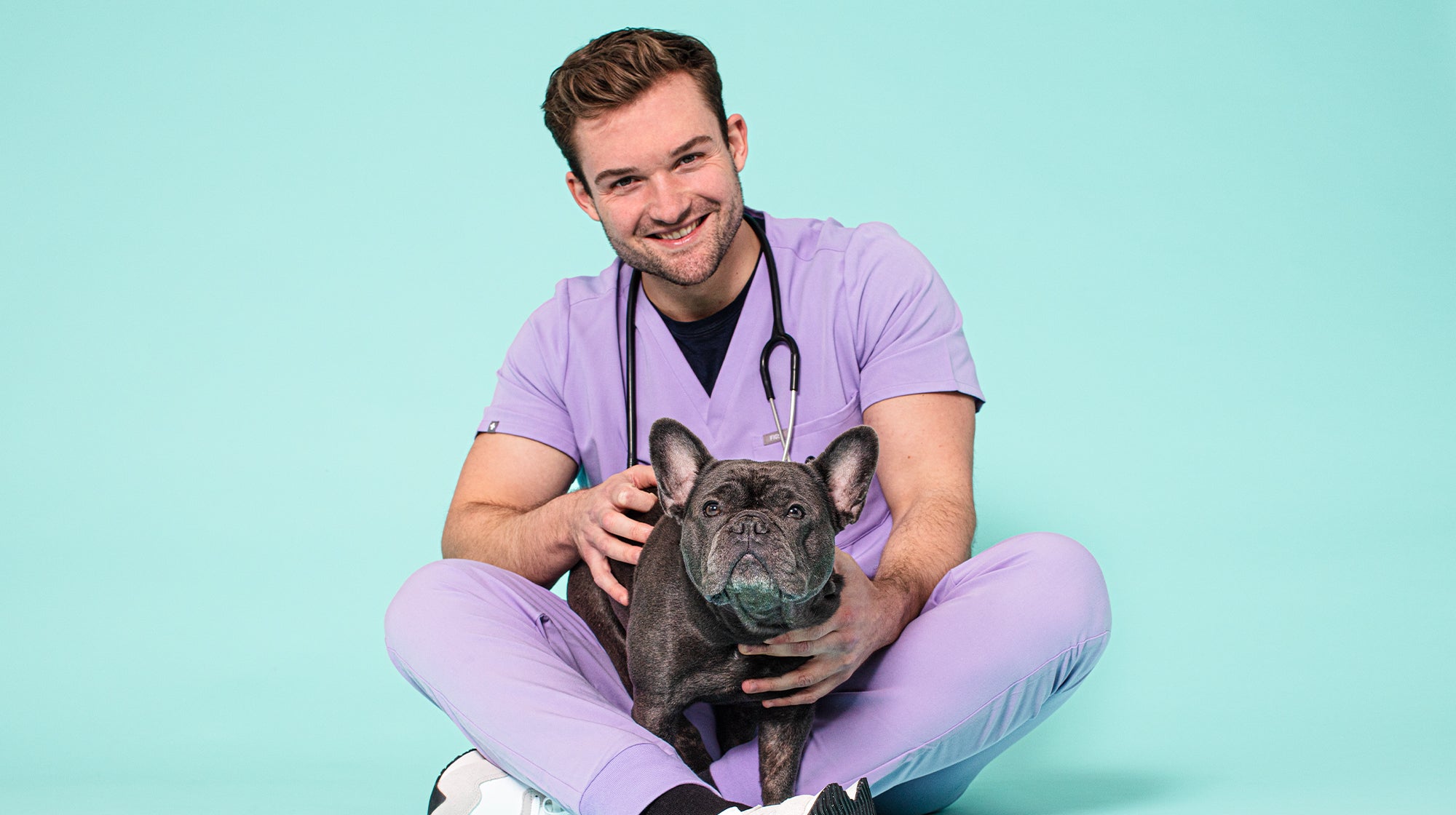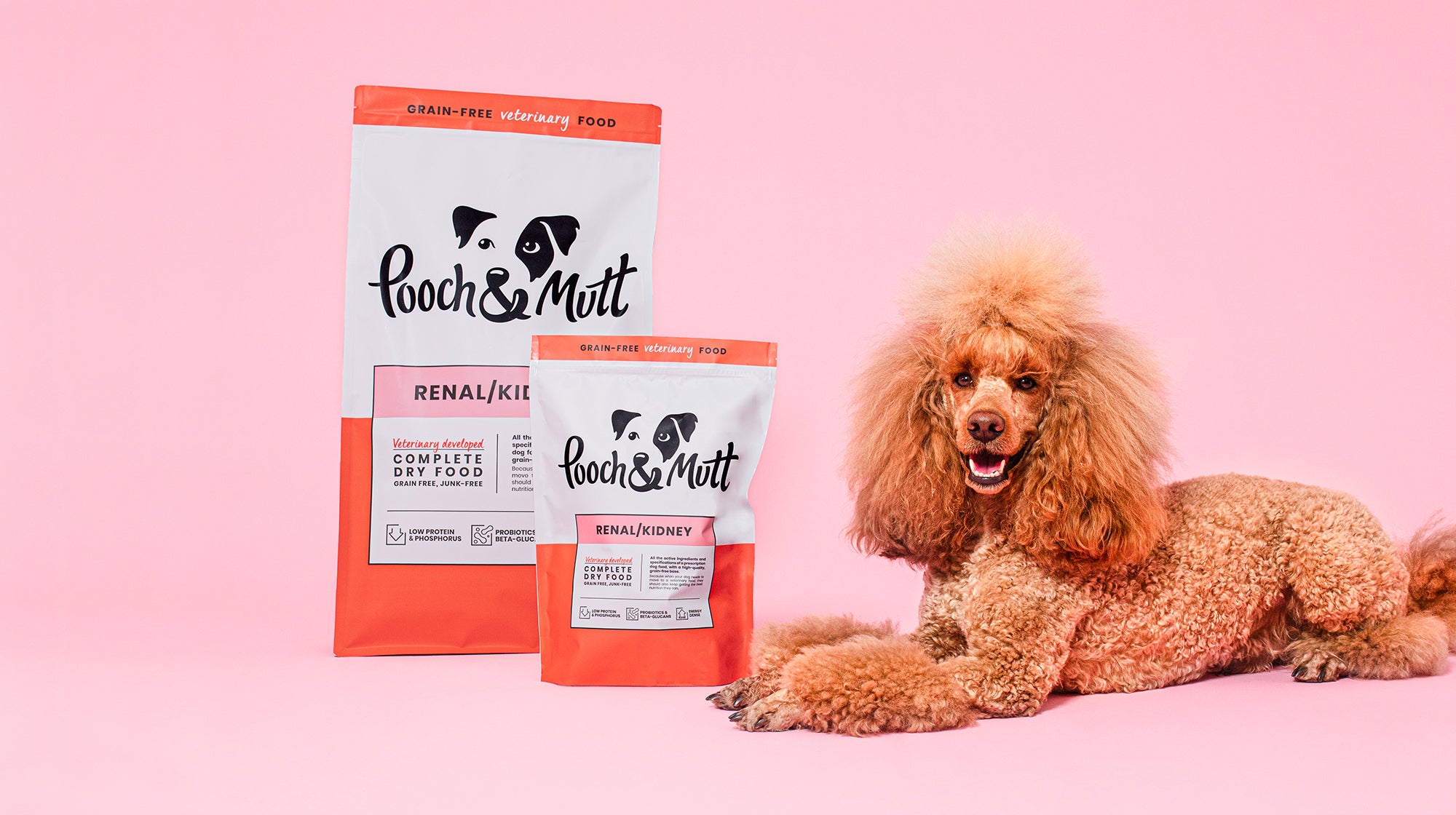
FREE UK DELIVERY ON ORDERS OVER £39.99
Do you have a precious pooch who suffers from kidney disease? This can be a worrying diagnosis for a dog parent, no matter what the severity - and you may have a barrage of questions and concerns. You may wonder what signs to watch out for, what causes kidney disease, how to treat it effectively and whether you should change your dog’s food? With the right advice, food and veterinary treatment, you should be well equipped to give your dog with kidney disease a calm, happy and comfortable life with as little trouble from their symptoms as possible.
If you’re in the dark over what could indicate kidney disease in your dog, or how to care for them if they develop kidney issues, come along with us as we go through the common causes, symptoms and treatment…
Kidney disease can also be called renal disease, and it comes in two forms: chronic and acute. It’s relatively common, especially in older dogs - however there are lots of potential contributors to a dog’s kidney problems, so the cause isn’t always completely clear.
As all the major organs, kidneys are extremely important to a dog’s functioning - they filter toxins from the blood, regulate levels of potassium and sodium, conserve water and produce urine. Therefore, symptoms of kidney disease in dogs often show up as dehydration or urinary issues, or as general sickness.
Look out for the following signs of kidney disease:
If your dog is displaying one or more of these signs, book an appointment with the vet immediately so they can do a thorough check of your pooch.
Once you’ve taken your dog to the vet and explained their symptoms, it’s likely they will carry out blood and urine tests. Abnormalities can show up in urine that indicate kidney disease, whereas an elevated blood pressure is also a sign. In some cases, your dog might go for an ultrasound or x-ray to check the size and shape of the kidneys.
If, after testing, it’s confirmed that your pooch has kidney disease, the next step will be to assess what type, and how advanced the disease is.
There are two types of kidney disease in dogs - chronic and acute:
Chronic kidney disease is irreversible, and means the kidneys progressively degrade over time. It’s usually caused by a kidney malfunction rather than consumption of a toxic substance or an illness, and though it means progressive deterioration of the kidneys, symptoms can appear to come on suddenly.
Acute kidney disease is usually sudden onset, and can be caused by either cancer or another illness, an injury, or as a reaction to a toxic substance. Acute kidney disease may be fatal in some cases, or it may be cured completely by treatment. In other cases, it may cause permanent damage that eventually leads to chronic kidney disease.

To identify just how poorly your dog is, and make it easier to assess treatment, kidney disease is diagnosed in stages.
Stage 1 indicates the very start of the disease - usually identified by extra protein in the urine, or overly dilute urine. The first stage is hard to detect, as it often shows very few symptoms, if any at all. Dogs are born with so much kidney tissue, that it could be months of damage to that tissue before any symptoms start to show. At this stage, your dog shouldn’t be feeling any discomfort.
Stage 2 is a very mild stage of kidney disease, in which a dog may be showing slightly more obvious symptoms such as a decreased appetite or weight loss. This is when the kidneys are becoming more damaged than in Stage 1.
Stage 3 is a moderate stage of kidney damage progression. Your pooch will start to show more severe signs of illness - they might be sick and get diarrhoea, appear to be generally low, go off their food, and pee and drink a lot more than usual. The medications your vet prescribes and the specialist food your dog eats will be even more vital at this stage of the disease.
Stage 4 is the most serious diagnosis - it generally indicates late to end stage of kidney disease, also known as kidney failure. When given this diagnosis, there usually isn’t a lot of time left, and the treatment will revolve around keeping your lovely dog comfortable, well loved and fed as well as possible for the rest of their time with you.

If your dog is diagnosed with kidney disease, their treatment will depend on the type and stage of their condition. At first, it may be putting them on a renal diet, which will later increase to include treatment for their more severe symptoms.
Generally, treatment could be any or all of the following:
We’ve mentioned a renal diet a few times in this article, as it’s a vital treatment for a dog with kidney problems. A renal diet, or kidney-friendly diet, will alleviate symptoms of kidney disease, protect the kidneys from working overtime and encourage your pooch to eat more, as they’re likely to go off their food as the disease progresses. Alongside the right medicines and treatment, a specialist, vet-recommended renal food should significantly improve your pooch’s wellbeing and even extend their life expectancy.
It can be nerve-wracking to know exactly what kind of food a dog with kidney disease should eat, and which food groups and snacks to avoid - so read our fuss-free article on the best food for dogs with kidney disease to put your mind at ease.
By the way, we have our own specialist dog food range for dogs with kidney disease - Pooch & Mutt Veterinary Renal Food. It has been thoughtfully formulated in accordance to a renal diet; so contains gentle proteins like salmon, peas and eggs; chicken fat for a delicious taste to stoke their appetite; and salmon oil for those essential Omega 3 fatty acids. A lot of renal foods on the market contain grain, making life difficult for pooches with kidney disease and a grain intolerance - so we’ve made sure our renal food is also entirely grain-free.
Our dogs are so precious to us, and we know that having a kidney disease diagnosis is far from a desirable outcome. No matter what their condition, having access to the right food and treatment can take some of the mental load off, so that you can concentrate on loving and caring for your dog every day.
If you’d like to put your dog on a grain-free renal diet for dogs, take a look at our Veterinary Renal Food, one of the specialist recipes in our new Veterinary range.
References
“Acute on chronic kidney disease in dogs: Etiology, clinical and clinicopathologic findings, prognostic markers, and survival”, 2020 - National Library of Medicine.
If you want to learn more about what to feed your dog if they have kidney problems, check out our blog here.





Never miss a treat!
Subscribe to our newsletter and get blog articles amongst other treats delivered to your inbox

Comments (15)
My dog has diabetes and stage 2 kidney do I get food to support the kidneys or diabetic food no one seems to know at the moment I am giving renal food but is it wrong for his diabetes
We would advise speaking to your vet about this, as they know your dogs history and would be best placed to advise which food is best for your pooch. :)
My 16 year old patterdale has been diagnosed with stage 3 kidney disease.She has been hospitalised for IV fluids and now at home with oral medication.She is drinking small amounts but refuses absolutely any food and we can’t get her tablets down her.What can we do to help her ?
We would advise speaking to your vet about this, as they know your dogs history and would be best placed to advise what to here. If we can help with anything else, please reach out to the team on [email protected]
my dog Milo a Morkie 12 years old has Kidney problems his BUN is 63 his CREATININE is 2.8 and SDMA IS 18.3 what can I do to help him Im willing to do anything please help he is my best friend
Hi ,Can I give my dog who is 14 months and been put on a Renal diet (Pooch & Mutt) your Peanut butter dental chews , as I thought peanut butter was bad for them ?
Thank you
Hi Julie,
Our Peanut butter dental sticks contain a very low protein level and would be a great treat for your pooch. Peanut butter is ok for dogs in moderation, so long as it doesn’t contain xylitol; which is dangerous for dogs. :)
Hello, my 2 1/2 yr old boxer dog was diagnosed with kidney disease today. his albumin is 1.2 yesterday & a week ago. It was 1.8. I hear normal is three. The doctor suggested science diet, but I was looking to see if there was something better than science diet. Any suggestions?
Hi Angela,
Our Renal Dry Food may be a suitable option for your pooch. It has been designed for renal function support and is suitable for those with stage 3 or 4 Renal Disease. It is a veterinary diet and we would always recommend consulting with your vet for further guidance before feeding. If there is anything else at all we can help with, please reach out to the team on [email protected] :)
My teacup yorkie 9 years old was diagnosed with kidney disease stage 3 and pancreatitis , was hospitalized for 3 days for Iv treatment which didn’t work. Was send home and prescribed Epakitin& Renal support diet . I felt like the vet had given up hope on my furbaby. Can I give my furbaby your brand of food . My furbaby means the world to me
Hi Miriam,
Our Renal dry food is suitable for dogs with stage 3 or 4 Kidney Disease and you can absolutely use our brand if you would like! If you have any further questions, please do reach out to our team on [email protected] :)
Hi, my border collie has late stage 3 kidney disease. I have been feeding her another brand of renal dog food (wet)and still have much of it left. Would I be okay mixing some of your dry renal food in with it as a biscuit, or even feeding her your renal food only when I take her away on day trips (for convenience)? Also are your peanut butter dental chews okay for her renal stage?
Hi Danni,
Our Renal dry food is suitable for dogs with stage 3 or 4 Kidney Disease and you can absolutely use this food when taking her away on trips. We would want to confirm with your own vet, whether they would be happy for this to be mixed with the wet food.
Our Peanut butter dental sticks contain a very low protein level and would be a great occasional treat for your pooch. :)
Hi, I am enquiring about your peanut butter dental sticks for a dog with stage 3 kidney disease. In your article you advise that as the dental sticks are low in protein, they are safe for her to eat…however in another article you advise renal dogs to stay well clear of peanut butter and I am also worried about the phosphorus levels in your dental sticks. Thank you in advance for your reply.
Hi Dan,
Peanut butter itself has quite a different nutrient profile to our Peanut Butter Dental Sticks. Our Peanut Butter Dental Sticks contain just 0.1% phosphorous, and for those with stage 3 or 4 renal disease, foods should contain less than 0.5% phosphorous, so these may indeed be a good option! If you do have any further questions or queries please reach out to the team at [email protected] :)
Leave a comment